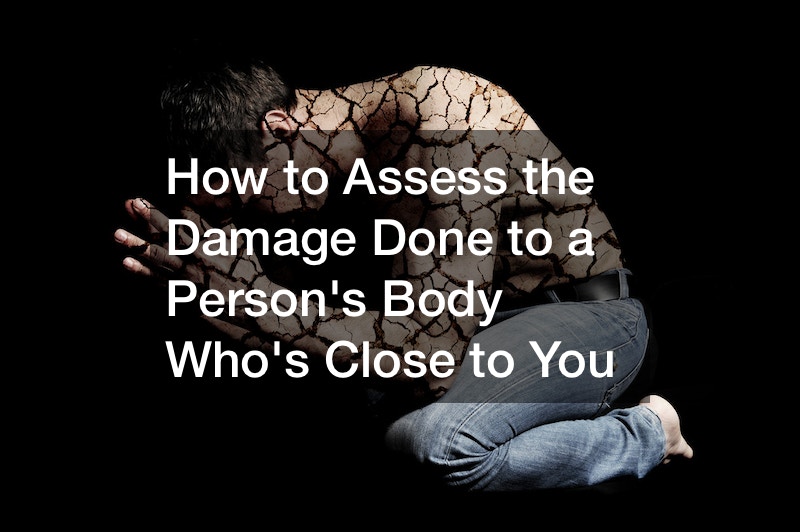
Caring for a loved one is not always simple, especially if they have struggled with addictions or issues with their body’s health in the past. Whether they have chronic illnesses, autoimmune diseases, addictions, or injuries from an accident, knowing how to assess the damage done to a person’s body can help you to determine what type of medical care or treatment they need most. In order to assess the damage done to a person’s body who is close to you, you will need to consider a variety of factors before you can make an informed assessment of their individual needs.
Determine How Often They Smoke or Drink

To first assess the damage done to a person’s body that’s close to you, it’s important to determine how often they smoke tobacco or drink and consume alcohol. Both alcohol consumption and the inhalation of tobacco can have adverse effects on the body, whether an individual has been using the substance for a few months or for many decades. Consider the frequency with which the individual who is close to you consumes alcohol or smokes cigarettes. It is also important to estimate how much alcohol they are consuming or how many cigarettes they are smoking on a daily or regular basis. The more familiar you become with their individual habits, the easier it will be for you to determine the appropriate course of action to take.
Adverse Effects of Alcohol and Tobacco Consumption
While most people understand that there are significant risks to consuming too much alcohol and tobacco, many do not know until it’s far too late. Risks of consuming too much alcohol can include kidney failure, liver failure, edema, vomiting, digestive issues, coma, and in serious cases, heart attacks, strokes, and death. Smoking too much tobacco can quickly lead to COPD, lung and respiratory infections, and ultimately, cancer of the lungs and other areas of the body. Speaking to your loved one about the risks of consuming alcohol and tobacco can help them to better understand that they will need to make different choices in order to recover or to remain healthy.
Treatment for Alcohol Addictions
If your loved one has recently received a DUI, you may want to help them enroll in DUI courses to avoid jail time or bigger fines and fees, depending on the court system’s ultimate ruling. If your loved one has always struggled with alcohol abuse or addiction, it may be time to consider an alcohol treatment center. Familiarizing yourself with various types of alcohol treatment centers can help you to find a location that is not only suitable for someone you know, but one that provides viable plans and solutions that will help guide them on the path to recovery.
Types of Treatment Centers
Anyone who is struggling with an addiction of any kind can find a treatment center for substance abuse. Substance abuse treatment centers or facilities typically provide various programs based on the orders of a court or an individual’s own needs and habits. Those who are seeking long-term care and want to live within a rehabilitation facility should seek out inpatient rehab programs. Inpatient rehabilitation programs typically last anywhere between 30 days to more than 6 months. The length and duration of a rehabilitation program will vary based on the rehabilitation facility as well as the individual’s personal needs and the severity of their addiction.
Individuals who are interested in visiting group therapy sessions, individual counseling, and rehabilitation facilities after work can do so with different outpatient programs. Outpatient rehabilitation programs provide those in need with resources to find their own individual road to recovery without requiring them to live within a facility or treatment center throughout the duration of their program. Outpatient programs can also include 12-step programs. Finding outpatient programs is possible with local resources and by comparing your options online before choosing a location that is right for your loved one or someone you know.
In some instances, IOP, or intensive outpatient programs may be ideal for someone you know. In other cases, IOP programs may be court-mandated by a judge. With an intensive outpatient program, resources that are typically provided with inpatient programs may also be available. However, this does not mean that those who are enrolled in an IOP program will be required to live within a rehabilitation center or facility for any length of time. IOP programs can be suitable for those who are commited to long-term jobs or are fully employed but want to stick to any goals they have regarding their sobriety and alcohol addiction treatment. Finding ther right IOP program is possible by checking with local mental health resources and addiction or rehab centers. This will help you to determine which program si likely to work best for someone you know before enrolling them.
Inquire About Their Cardiovascular Fitness
Inquiring about the cardiovascular fitness and health of someone you know is essential to assess the damage done to a person’s body. Both the heart and brain are integral parts of the human body. A heart that is not properly functioning is more likely to endure excessive stress while being put at risk of a heart attack. Inquiring about the cardiovascular fitness of someone you know can help you to determine if they are in need of seeing a cardiologist or another heart specialist for their specific needs.
When asking about cardiovascular fitness, be sure to inquire about past heart attacks, angina diagnoses, blockages, and even strokes that an individual has experienced. This can help you to find the right medical facility or professional to address potential pain, shortness of breath, or palpitations that your loved one may be experiencing. When searching for the appropriate cardiologist, consider any potential preexisting conditions as well as the age of your loved one. You should also keep whether or not they have a substance abuse addiction in mind when addressing the cardiologist or specialist you intend to visit.
If someone you know has struggled with their ability to walk due to vein issues, consider professional laser varicose vein removal. While many vein removal surgeries in the past were completed due to cosmetic reasons, they are also available to help relieve pressure and strains inside the veins today. Finding the right laser varicose vein removal professional is possible by calling the insurance provider of your loved one and by conducting research locally and online, based on your loved one’s current location.
Assess Their Gut and Respiratory Health

Assessing the damage done to a person’s body is not complete without understanding the gut and respiratory health as well. The gut is directly linked to the human brain, which renders our entire reality and how we perceive and experience the world around us each day. When you want to know more about the potential damage that has been done to the body of someone you know, you should ask about potential gut issues, digestive troubles, and respiratory diagnoses they have received in the past. From classic IBS symptoms to tapeworm and even COPD, gut and respiratory health have a major impact on the overall health of the body.
If you are unfamiliar with the past of someone you know and what they may have been exposed to in terms of their gut and respiratory health, ask about asbestos exposure and even waterborne pathogens they may have encountered. If someone you know who is struggling with their health is living in a location that is riddled with asbestos, it is imperative to contact an asbestos removal contractor immediately. Removing any and all traces of asbestos from a property is essential to minimize the risk of developing serious, if not life-threatening issues that have been caused by the exposure itself.
Create a Space to Talk About Mental Health
When you are in the process of assessing the damage done to a person’s body, creating a space to talk about mental health can go a long way. This is especially true for individuals who may not feel comfortable or ready to discuss past traumas or their own mental health in a public location. The more comfortable someone you know feels with you, the more likely they are to open up about how they are feeling mentally and emotionally.
Talking about mental health can help someone you know to face potential traumas, triggers, and underlying issues they are facing each day. The more open and honest you are with your loved one, the less likely they are to feel intimidated or scared to share their own feelings. Opening up about your own mental health struggles and your past experiences with mental health can help someone you know to feel less alone. Creating a safe space is about more than just providing someone you know with a room to talk in. Building a good rapport with your loved one will help them truly feel safe and able to discuss their feelings.
You can also help your loved one to find the right therapy program that is ideal for them based on their personal and individual struggles. Searching for CBT (Cognitive Behavioral Therapy) programs, social anxiety exposure therapy solutions, or even family counseling sessions can all be beneficial for your loved one, depending on their needs.
Create Something to Look Forward To

While you are in the process of assessing the damage done to a person’s body in order to get them the help they may need, it’s important to create something that they can look forward to each day. Whether you help your loved one discover a new hobby or explore a skill they have always wanted to pursue, giving a loved one something to look forward to can go a long way in their recovery or on their journey to regaining health.
Depending on who you are trying to help in your life, you may present them with anniversary flowers to show your appreciation and love. If you want to help your loved one look forward to the future, consider discussing potential life insurance options that are available for you and your loved one. Investing in your future is one way to remain goal-oriented and to have something to look forward to and work towards.
Ensure They’re Smiling All Through Life
When it comes to assessing the damage done to a person’s body over the course of years or even decades, it’s also important to consider the mental and emotional trauma they may have endured. Taking mental health seriously can have a significant impact on how an individual views themselves and their potential future. Assisting your loved one with the right mental health care is essential to ensure they remain on the right path of recovery, regardless of what damage they are addressing and attempting to undo in their lives.
You can also help a loved one to keep smiling through life by assisting them with proper dental care. Oral care is essential to maintain a healthy and vibrant smile, especially as we age. Research local dentists or even an emergency dentist that is available near you based on your loved one’s needs and whether or not they are currently suffering in pain due to a cavity or another tooth-related issue.
If you are caring for a loved one who is considered elderly or a senior citizen, you may want to consider alternative housing solutions that are right for their needs. Senior housing is one option to consider. Senior housing solutions can range from medically assisted facilities to independent locations, depending on the needs of your loved one as well as their own abilities.
Learning how to assess the damage done to a person’s body who’s close to you is not always easy, especially if your loved one is in severe pain or is struggling in their day-to-day life. When you are familiar with the habits and past of someone who is close to you, it is much easier to find them the help that they need in order to face and overcome their daily challenges. Taking the time to assess the damage done to a person’s body who is close to you provides you with the opportunity to offer resources and lend a helping hand when they need it most in life.


